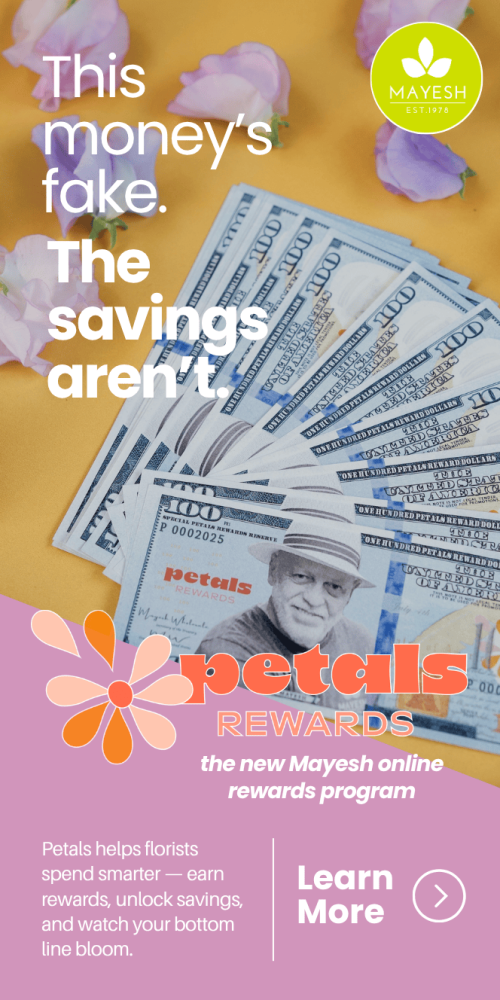By Tonneli Grüetter
In recent years, small-scale flower farmers have gained a new secret weapon: code-name “CSA,” which is an initialism for Community Supported Agriculture. The basic function of a CSA is to create a season-long stable and predictable stream of income for farms or farmer co-ops by advance-selling their products directly to customers. Customers become “subscribers” of a farm and receive regular shares of the farm’s produce. Historically, CSAs were mostly associated with small to midsized produce farms, but in recent years, the concept has gained viability for other farmed items, namely locally grown cut flowers. A flower CSA, which is also sometimes called “subscription” or “share,” operates similarly to produce CSAs, but instead of receiving weekly boxes of kale, squash and the like, flower CSA subscribers receive regular bouquets or arrangements of farm-fresh blooms.


For small to midsize cut flower growers and local grower-collaborating flower shops, we recommend considering the following benefits of launching a flower CSA program.
1. Reliable Revenue. CSA subscriptions give flower businesses a predictable stream of income. Subscriptions or “shares” are sold in advance. Through this, farmers can prepare for and manage crops. No longer does a farmer need to gamble on farm plans, harvest schedules and logistics. Additionally, this advance payment can provide a welcome financial boost to farmers needing to invest in seed stock and bulbs for the future. It is not uncommon to require one-year advance ordering of specialty varieties.
2. Relationship Building. CSA subscriptions take growers on a journey from “farmer” to “friend” in the eyes of their customers. Customer loyalty is built through this system, which enables farmers to get direct feedback about their products in real-time.
3. Copious Content. Finding the opportunity to show off their blooms in a variety of spaces can be difficult for field-bound growers. By involving themselves in the delivery logistics process, flower CSA businesses find they are never at a loss for fresh marketing content—as long as they keep their cameras and social media channels at the ready.
4. Work-Life Balance. Almost all small-business operators will agree that achieving and maintaining a work-life balance is as important as it is difficult. The predictable scheduled nature of CSA programs creates a naturally flowing schedule that growers and florists can use to estimate output and logistical needs. Additionally, the CSA model provides an opportunity, through tracking, to reduce over-planting and over-harvesting, ensuring that stems can be sold at full price.
Farmer-florist Sarah Gainey, owner of The Rookery Flower Farm + Floral Design in Seattle, Wash., who recently added a CSA to her business, shared the incredible benefits her small farm has seen through adopting this business model in addition to her other income streams. “One benefit of starting a flower CSA has been the predictable and consistent work it provides. Weeks in advance, I know who needs flowers and when and where they need them,” she notes. “I love knowing what each week is going to look like far in advance. Having a CSA eliminates the guesswork and speculation.”

Providing a steady and predictable record of sales, with advance payment, provides flower farmers a leg up on the next season, but to Gainey, that isn’t the best part. In singing the praises of CSA business models, Gainey shares that her favorite part, and the benefit she values most, is getting to know her customers on a personal level through repeat, long-term patronage, which builds brand loyalty. “My CSA relationships have been incredibly important to me. I started my business during the height of the COVID pandemic, when we all were practicing social distancing.” Sarah says that while isolation was everywhere and flowers were faltering, her business set deep roots and built relationships that, today, have grown into a network of repeat customers, referrals and entire plots of flowers that are sold in advance.
Is a CSA Right for You and Your Business?
When assessing if a flower CSA is right for your business, it is important to first understand that it requires a strong commitment to consistency, which may not be the right choice for every flower business. However, for farmers or florists ready to take the jump and create a full-season subscription or a short-run share such as a three-week peony CSA, the potential for growth is great. For those looking to get in on the CSA fun but with less upfront commitment of soft resources, a popular choice is to collaborate with an existing produce CSA through a farm or co-op in their area. When they are successful, flower CSAs offer numerous benefits, including predictable revenue, strong customer loyalty, new opportunities to collaborate, enhanced resource management and risk mitigation.
Do you have a CSA? Florists’ Review would love to learn about it. Share your CSA experience on social media @floristsreview.
“One benefit of starting a flower CSA has been the predictable and consistent work it provides. Weeks in advance, I know who needs flowers and when and where they need them. I love knowing what each week is going to look like far in advance. Having a CSA eliminates the guesswork and speculation.”
— Sarah Gainey, owner of The Rookery Flower Farm + Floral Design; Seattle, Wash.
























